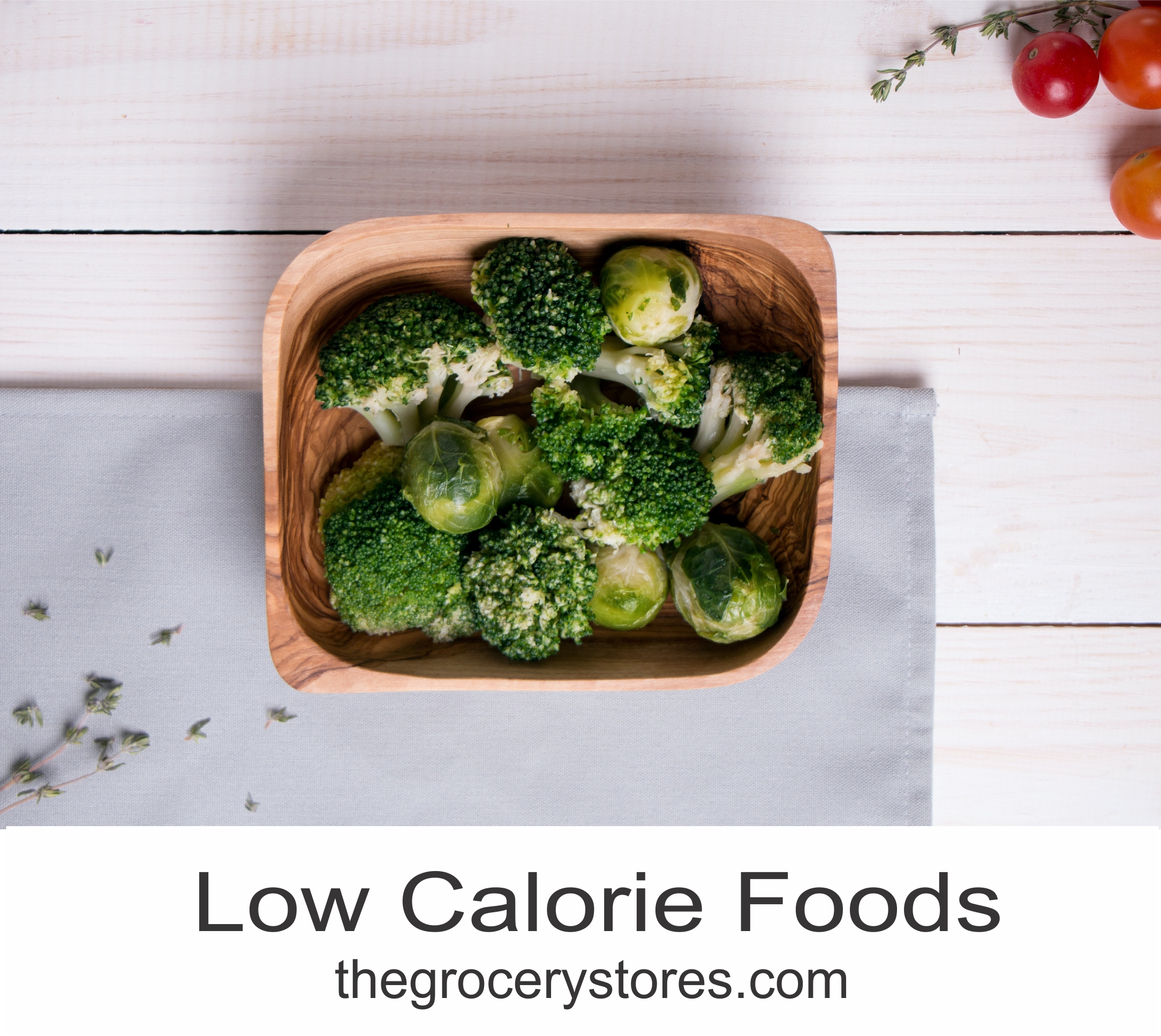Maintaining a healthy diet is essential for overall well-being, and one way to do this is by incorporating low-calorie foods into your meals. These foods not only help you manage your weight but also provide essential nutrients. Here’s a list of 10 low-calorie foods to buy at the grocery store to begin your journey toward a healthier lifestyle.
1. Leafy Greens (e.g., spinach, kale, lettuce): Leafy greens are some of the most nutrient-dense foods available. They are rich in vitamins, particularly vitamin K. Leafy greens are exceptionally low in calories. You can consume large portions without worrying about excess calories. These greens are high in dietary fiber, which aids in digestion and helps regulate blood sugar levels. Many leafy greens are packed with antioxidants. Leafy greens are versatile ingredients that can be used in various dishes. They work well in salads, smoothies, sandwiches, and as side dishes when steamed or sautéed.
2. Cucumbers: Cucumbers are composed mostly of water, making them an excellent choice for staying hydrated, especially during hot weather. They are extremely low in calories, making them a guilt-free snack or addition to your meals when you’re watching your calorie intake. Cucumbers provide essential vitamins and minerals, including vitamin K, vitamin C, and potassium. Cucumbers contain fiber and water, which can aid in digestion and help prevent constipation. To maximize their nutritional value, it’s best to eat cucumbers with the skin on, as many of the nutrients are concentrated in the skin.
3. Bell Peppers: Bell peppers come in various colors, including red, green, yellow, and orange, and they are all rich in vitamins and minerals, making them a colorful addition to your plate. Bell peppers, especially the red ones, are packed with vitamin C, which is essential for a healthy immune system and skin. Bell peppers are low in calories, making them a guilt-free snack or ingredient in your meals, whether raw or cooked. They can be used in salads, stir-fries, fajitas, and omelets, and as a colorful vessel for stuffing with various ingredients. These peppers contain dietary fiber.
4. Berries (e.g., strawberries, blueberries): Berries are renowned for their high levels of antioxidants, particularly anthocyanins. Berries are naturally low in calories, making them an ideal choice for those looking to maintain or lose weight while enjoying a sweet treat. They are a great source of vitamins and dietary fiber. Berries can be enjoyed on their own as a snack, added to yogurt, oatmeal, or smoothies, and used in desserts, salads, or sauces.
5. Broccoli: Broccoli is a rich source of vitamins, particularly vitamin C and vitamin K. It contains dietary fiber, which aids in digestion, promotes a feeling of fullness, and supports a healthy gut. Broccoli is packed with antioxidants like sulforaphane, which may have cancer-fighting properties and help protect cells from damage. Despite its nutritional density, broccoli is low in calories, making it an excellent choice for those watching their calorie intake. Broccoli can be enjoyed steamed, roasted, sautéed, or added to soups and stir-fries. It’s a versatile vegetable that can be incorporated into various dishes.
6. Cauliflower: Despite its pale appearance, cauliflower is rich in essential nutrients, including vitamin C and vitamin K. Cauliflower is remarkably low in calories and carbohydrates, making it an excellent option for those on low-carb or calorie-restricted diets. It contains dietary fiber, which aids in digestion, promotes satiety and supports a healthy gut. You can prepare cauliflower in various ways, including roasting, steaming, sautéing, or even as a nutritious addition to soups and salads.
7. Celery: Celery is primarily composed of water, making it an excellent choice for staying hydrated. It’s also incredibly low in calories, making it a popular option for weight-conscious individuals. This vegetable contains dietary fiber, which aids in digestion and can help keep your digestive system healthy. Celery’s crisp texture provides a satisfying crunch when eaten raw, making it a great choice for snacking, especially when paired with dips or peanut butter. While celery is low in calories, it still provides essential vitamins and minerals, including vitamin K and potassium. Celery has a mild, refreshing flavor that can complement a variety of dishes, from salads and soups to stir-fries and casseroles. Celery is a common ingredient in stocks and soups, adding depth of flavor without many additional calories.
8. Carrots: Carrots are one of the best sources of beta-carotene, a type of antioxidant that the body can convert into vitamin A. Carrots are low in calories and a smart choice for snacking, making them a popular option for those looking to manage their weight. They contain dietary fiber, which aids in digestion, promotes a feeling of fullness, and supports a healthy gut. Carrots have a naturally sweet flavor and
a satisfying crunch, making them a versatile addition to salads, stir-fries, and as a snack. Carrots can be enjoyed raw, steamed, roasted, or added to soups and stews. They add flavor, color, and nutrition to a wide range of dishes. In addition to vitamin A, carrots provide vitamins like vitamin K, vitamin C, and several B vitamins, as well as minerals like potassium.
9. Tomatoes: Tomatoes are one of the most versatile ingredients in cooking, used in a wide range of dishes from salads to sauces. They are a source of essential vitamins, including vitamin C and vitamin K. Tomatoes are composed of a high water content, contributing to hydration, and they are naturally low in calories, making them suitable for calorie-conscious diets.
10. Zucchini: Zucchini is incredibly low in calories and carbohydrates, making it a popular choice for low-calorie or low-carb diets. Despite its low-calorie count, zucchini provides essential vitamins and minerals, including vitamin C and vitamin B6. It contains potassium. Zucchini has a high water content, contributing to hydration and aiding in weight management by promoting a feeling of fullness. Zucchini can be used in a variety of dishes. It can be sautéed, grilled, roasted, spiralized into noodles, or added to soups and casseroles. Zucchini contains dietary fiber, which supports digestive health and regular bowel movements. Regular consumption of zucchini may help with weight loss, improve digestion, and provide essential nutrients with minimal calorie intake.
Summary
Incorporating these top 10 low-calorie foods into your grocery shopping list is a smart choice for anyone looking to maintain a balanced diet and manage their weight. These foods are easily accessible in your local grocery stores and have several health benefits.

